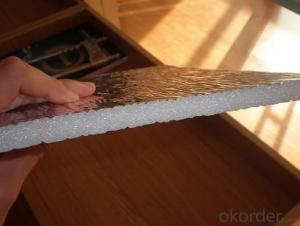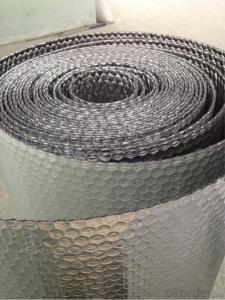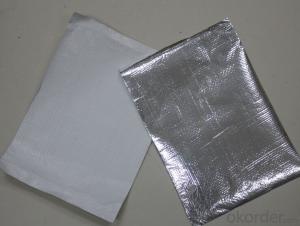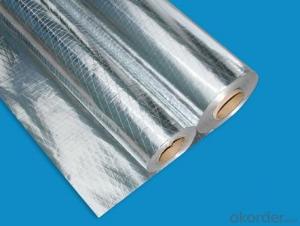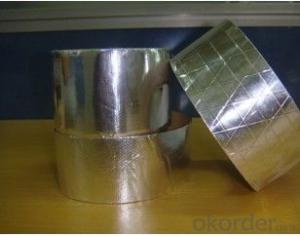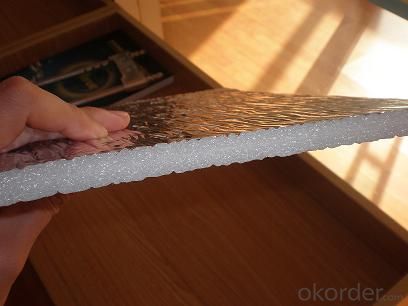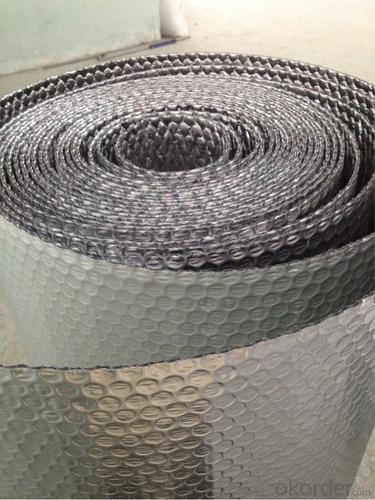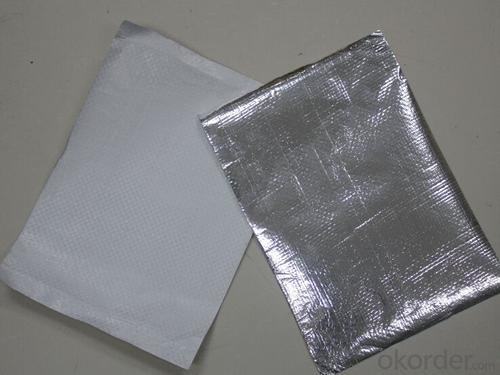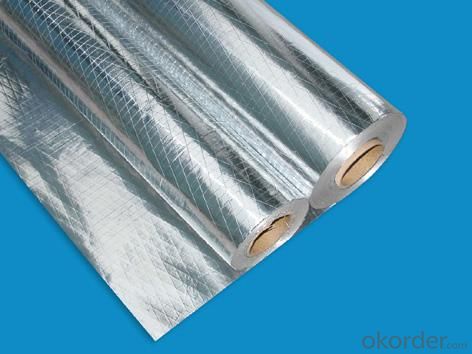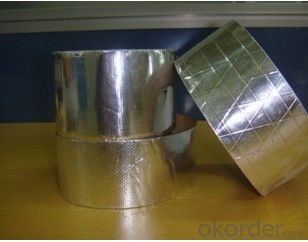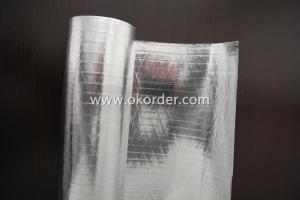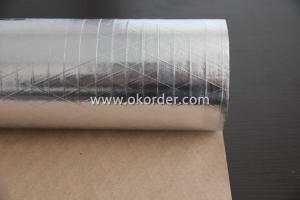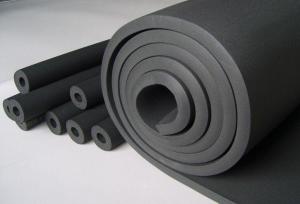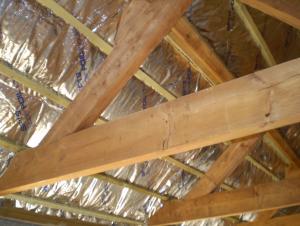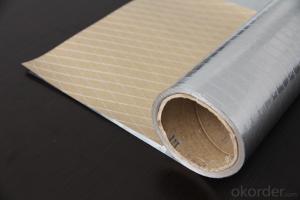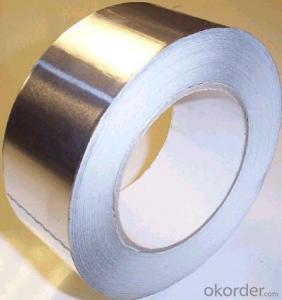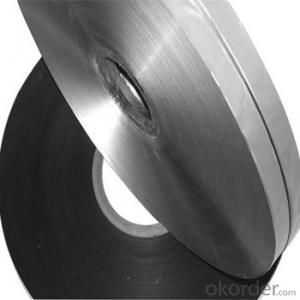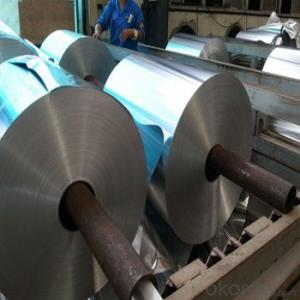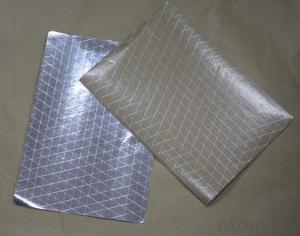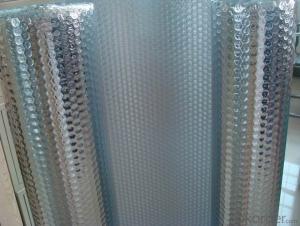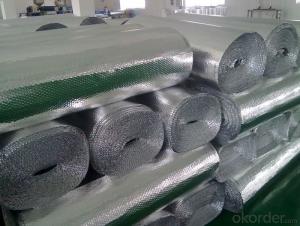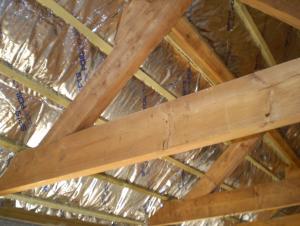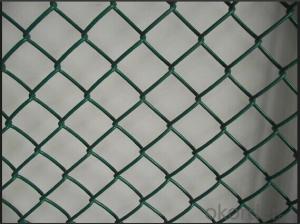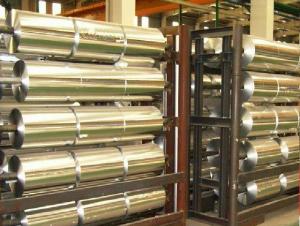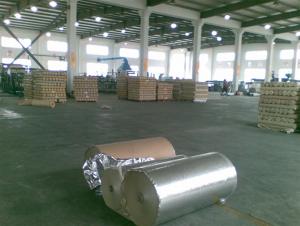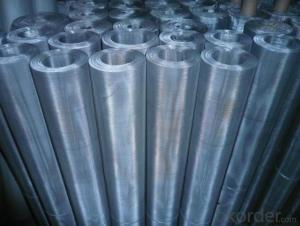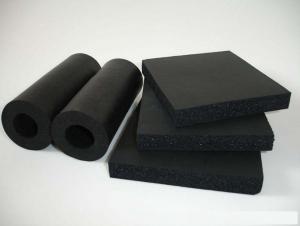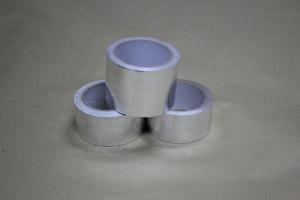Aluminum Foil Facing Insulation Flexible Ducts Bubble Foil AL+LDPE Mylar Film for Heat Seal
- Loading Port:
- Tianjin
- Payment Terms:
- TT OR LC
- Min Order Qty:
- 12 m²
- Supply Capability:
- 30000 m²/month
OKorder Service Pledge
OKorder Financial Service
You Might Also Like
).Raw material for Aluminium: 1235-0, 8011
Raw material for PET: New PET ,OPP is also available
2).Different kinds:
| structure | Normal laminated thickness | Width | Length | Color | ID | OD | Packin |
| AL+PET+LDPE | 7umAlu+15umPet+3umGlue | 6mm-1000mm as your required | 500m-7000m | Silver blue bronze black others | 2"or3" | 250mm-600mm | polybag caron pallet
|
| 9umAlu+12umPet+3umGlue | |||||||
| AL+PET+AL | 6umAlu+15umPet+6umAlu+6umGlue | ||||||
| PET+AL+PET | 15umPet+7umAlu+15umPet | ||||||
| AL+PET+EAA | 7umAL+15umPET+25umEAA+6umglue | ||||||
| AL+PET+AL+EAA | 7umAlu+15umPET+7umAlu+25umEAA+9umglue | ||||||
| PET+PET | 15umPet+15umPet +3umGlue | ||||||
| Polyester Tape | 15um,18um |
3).Certificaton: SGS
4).Specifications:
The following is the single side aluminium mylar tape specifications for you take reference:
Description: Al+PET Tape(AL/myler Tape) | ||||
Composition:aluminium foil and polyester film | ||||
Structure | Thickness(um) | Proportion(g/m2) | Elongation(%) | Strength(N/15mm) |
6um AL/12um PET | 20 | 36 | 30 | 2.7 |
7um AL/15um PET | 25 | 43 | 35 | 2.7 |
7um AL/20um PET | 30 | 50 | 35 | 3 |
9um AL/12um PET | 25 | 45 | 30 | 2.7 |
9um AL/15um PET | 30 | 49 | 35 | 3 |
9um AL/20um PET | 35 | 55 | 35 | 3 |
9um AL/25um PET | 38 | 62 | 35 | 4 |
12um AL/12um PET | 25 | 53 | 20 | 2 |
12um AL/15um PET | 30 | 57 | 20 | 3 |
12um AL/20um PET | 35 | 63 | 30 | 4 |
15um AL/15um PET | 30 | 65 | 20 | 3 |
25um AL/15um PET | 45 | 92 | 20 | 3 |
30um AL/25um PET | 60 | 119 | 20 | 3 |
30um AL/30um PET | 65 | 126 | 20 | 5 |
40um AL/30um PET | 75 | 153 | 20 | 5 |
40um AL/38um PET | 80 | 163 | 20 | 5 |
50um AL/25um PET | 90 | 173 | 20 | 5 |
50um AL/50um PET | 100 | 207 | 35 | 6 |
Above values refer to our current production and must be intended as average values | ||||
The reference is not including all specification. | ||||
- Q: The user is asking if they can use paper plates and plastic utensils as an alternative to aluminum foil for their next meal.
- <p>Yes, you can use paper plates and plastic utensils instead of aluminum foil for your next meal. Paper plates are a great alternative for serving food and can be easily disposed of after use. Plastic utensils are also a convenient option, especially for outdoor meals or when you want to avoid washing dishes. However, it's important to consider the environmental impact of using disposable items. If you're concerned about sustainability, consider reusable options or biodegradable alternatives to minimize waste.</p>
- Q: What are the most effective ways to clean surfaces that have aluminum foil applied to them?
- <p>The best cleaning methods for aluminum foil facing involve gentle cleaning to avoid damaging the foil. Use a soft cloth or sponge with warm water and mild dish soap to wipe the surface. Avoid abrasive cleaners or scrubbing, as this can scratch or tear the foil. For stubborn stains, a mixture of baking soda and water can be applied as a paste and gently rubbed with a soft cloth. Always rinse thoroughly and dry the surface to prevent water spots and maintain the integrity of the aluminum foil.</p>
- Q: This question asks for methods to utilize aluminum foil as a tool for preparing quick and easy meals.
- <p>Aluminum foil facing is a versatile tool for quick meal preparation. One method is the 'foil packet' technique, where you place ingredients like vegetables, protein, and seasonings in a foil pouch and bake or grill. This method helps retain moisture and flavor. Another way is to use foil as a makeshift baking tray for items like fish or potatoes, which can be seasoned and wrapped in foil for a one-step cleanup. Foil can also be used to cover food during grilling to prevent flare-ups or to steam vegetables. Always ensure food is cooked thoroughly and be cautious of potential aluminum leaching, especially with acidic foods.</p>
- Q: This question asks for the optimal methods of preserving leftover food using aluminum foil.
- <p>The best ways to store leftovers using aluminum foil involve ensuring the food is cool before wrapping, covering the entire dish tightly, and sealing the foil properly. First, let the leftovers cool down to room temperature to prevent condensation. Then, wrap the dish completely with aluminum foil, making sure to cover the edges and corners to avoid air exposure. For added protection, you can double-wrap the dish. Seal the foil by pressing the edges together firmly. Store the wrapped leftovers in the refrigerator or freezer, depending on how soon you plan to consume them.</p>
- Q: This question asks if there are any potential issues or risks associated with storing food in plastic containers for extended periods.
- <p>Yes, there are concerns about using plastic containers for long-term food storage. Certain plastics can leach chemicals, such as BPA (Bisphenol A) and phthalates, which may be harmful when ingested over time. These chemicals can migrate into the food, especially with exposure to heat or over extended periods. Additionally, plastic containers can break down over time, potentially releasing harmful substances into the food. It's recommended to use food-grade, BPA-free plastics or alternatives like glass containers for long-term storage to minimize health risks.</p>
- Q: What specific safety measures should be considered when utilizing aluminum foil in a kitchen setting?
- <p>When using aluminum foil in the kitchen, it's important to handle it carefully to avoid sharp edges that can cause cuts. Avoid using it in direct contact with an open flame as it can melt and release toxic fumes. Do not use aluminum foil with non-stick cookware as it can damage the surface. Keep it away from high heat sources like broilers and never use it to line baking sheets as it can catch fire. Always ensure that any food wrapped in aluminum foil is sealed properly to prevent the foil from coming into contact with heat sources directly.</p>
- Q: Is it possible to use aluminum foil facing as a substitute for a pan or pot when making fried rice?
- <p>While aluminum foil can be used for various cooking purposes, it is not recommended to use it for making fried rice. Aluminum foil is not designed to withstand high heat and can warp or tear easily, leading to uneven cooking or potential food safety issues. Instead, use a non-stick pan or wok designed for high-heat cooking to ensure even heating and prevent sticking, which is crucial for a well-prepared fried rice dish.</p>
- Q: What is the most suitable material for food packaging that ensures safety and is also eco-friendly?
- <p>The best material for food packaging that is both safe and environmentally friendly is biodegradable or compostable material. Materials such as PLA (Polylactic Acid), made from renewable resources like corn starch, and paper-based packaging are preferred. They are non-toxic, compostable, and reduce plastic waste. Additionally, materials like glass and metal can be recycled and are also considered safe for food contact. However, it's crucial to consider the entire lifecycle of the packaging to ensure it's truly sustainable.</p>
- Q: Is it possible to use aluminum foil with a reflective side to create a wrap for outdoor eating purposes?
- <p>Yes, you can use aluminum foil facing to make a wrap for eating outdoors. Aluminum foil is a versatile material that can be used to wrap food for various purposes, including outdoor dining. The reflective side can help keep the food warm or cool, depending on the situation. However, it's important to ensure that the foil does not come into direct contact with the food, especially if it's acidic or high in salt, as this can cause the foil to break down and potentially contaminate the food. Use the foil as a barrier or layer between the food and other surfaces to maintain hygiene and椋熷搧瀹夊叏.</p>
- Q: Explain the differences between thin and thick aluminum foil facing in terms of thickness, durability, and usage.
- <p>Thin aluminum foil facing is characterized by its low thickness, which makes it flexible and easy to handle but less durable. It's commonly used for wrapping food, baking, and protecting surfaces. Thick aluminum foil facing, on the other hand, is more robust and tear-resistant, suitable for heavy-duty applications such as construction, insulation, and packaging. The thicker material offers better protection and durability, but it's less pliable and can be more challenging to work with.</p>
Send your message to us
Aluminum Foil Facing Insulation Flexible Ducts Bubble Foil AL+LDPE Mylar Film for Heat Seal
- Loading Port:
- Tianjin
- Payment Terms:
- TT OR LC
- Min Order Qty:
- 12 m²
- Supply Capability:
- 30000 m²/month
OKorder Service Pledge
OKorder Financial Service
Similar products
Hot products
Hot Searches
Related keywords
